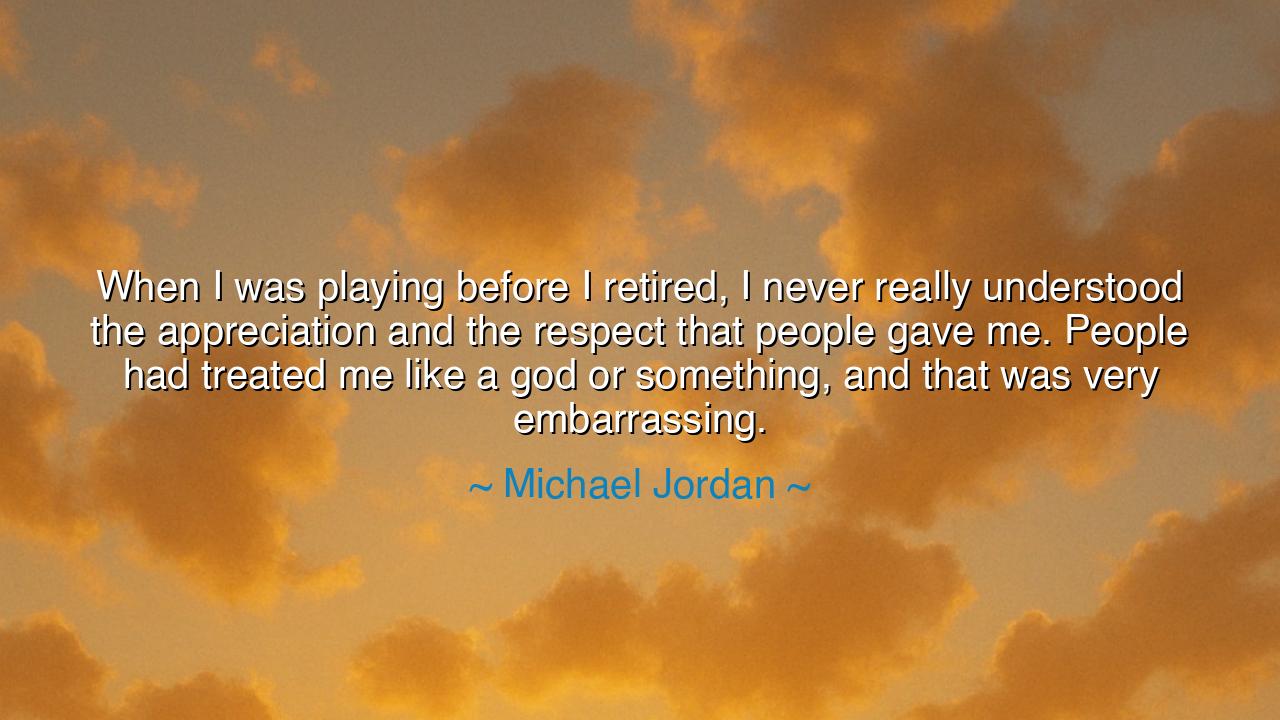
When I was playing before I retired, I never really understood
When I was playing before I retired, I never really understood the appreciation and the respect that people gave me. People had treated me like a god or something, and that was very embarrassing.






"When I was playing before I retired, I never really understood the appreciation and the respect that people gave me. People had treated me like a god or something, and that was very embarrassing." In the words of Michael Jordan, we hear a profound reflection on the nature of fame, adulation, and the human condition. It is rare for those who stand at the summit of greatness to understand the depths of their own influence, especially when the world sees them as more than human, as icons, as figures to be revered with almost divine reverence. To Jordan, this adoration was not something he sought or fully comprehended—it was, instead, a burden, one that carried with it a sense of embarrassment, an unease with being placed upon a pedestal far above the reach of ordinary men.
In the ancient world, there was no shortage of figures who were revered in much the same way. Alexander the Great, upon conquering vast lands and leading his armies to unimaginable triumphs, found himself not only a conqueror but a god in the eyes of those he ruled. His soldiers saw him as a divine figure, and many cultures, from Egypt to Greece, came to worship him as a deity. Yet, like Jordan, Alexander's own understanding of this reverence was complicated. To be treated as divine was both a source of immense power and a crushing weight. In his private moments, did Alexander truly believe in his own godhood, or did he, like Jordan, feel the embarrassment of being placed beyond the realm of human frailty?
The Greeks themselves, though they revered their gods, often told stories of gods who were fallible, who made mistakes, who suffered in ways that made them more relatable to humans. Zeus, the king of the gods, was not above human flaws. He made rash decisions, he loved deeply, and he faced the consequences of his actions. In many ways, the gods were not so much perfect beings but reflections of the complexity and imperfection of humanity itself. The ancient Greeks understood that respect and reverence should not place one so high above others that they were no longer human. In their pantheon, even the gods could fall from grace, and perhaps in this, there lies a lesson for those who are idolized by the masses.
Jordan’s reflection echoes the same human truth that ancient philosophers explored: that fame and adoration can distort one’s sense of self and distance one from the true essence of being human. The pressure to live up to a godlike ideal can be both humbling and overwhelming. For those who stand in the spotlight, the admiration of others can often feel more like a cage than a triumph. Cicero, the Roman philosopher, once said, "The higher we are placed, the more humbly we should behave." This wisdom suggests that true greatness does not lie in how one is seen by the world but in how one remains grounded in the face of overwhelming adulation.
When we consider the life of Michael Jordan, his humility in the face of his own immense fame is an example of wisdom in action. He was revered as the greatest basketball player of all time, a man whose feats on the court transcended the limits of human performance. Yet, Jordan never fully understood why people treated him as a god—why they looked to him not just for his athleticism, but for something deeper, something divine. His story reflects the complexity of human greatness: while the world may elevate a person to a high pedestal, that person remains deeply human and often uncomfortable with the weight of their own mythology.
From this, the lesson is clear: fame, respect, and appreciation are powerful forces, but they can easily blind us to the humility and vulnerability that make us truly human. Michael Jordan’s embarrassment with being treated as more than human reminds us of the importance of staying grounded and recognizing that the greatness we achieve is not meant to distance us from others but to inspire them to see their own potential. To be revered is a form of power, but to embrace humility in the face of that power is what ensures that true greatness endures.
Let us reflect on this truth in our own lives, whether we rise to positions of influence or remain in the quiet shadows of the world. It is not the heights we reach that define us, but how we respond to the respect and adulation of others. True wisdom lies in recognizing that while we may be honored by those around us, we are still bound by the same flaws, fears, and limitations that make us human. In this, we find not just greatness, but authenticity, the true measure of a life well lived.






AAdministratorAdministrator
Welcome, honored guests. Please leave a comment, we will respond soon